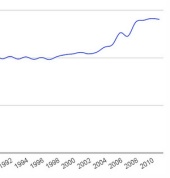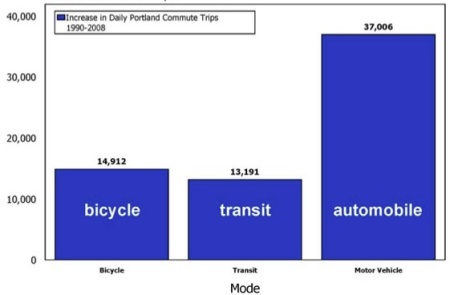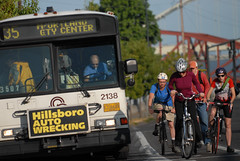In Portland and other cities across the U.S., the cost of transit is going up. A combination of factors is making it hard for transit agencies to make financial ends meet and the result is often not just service cutbacks but fare increases as well.
This morning TriMet announced a grave warning about a $17 million budget shortfall next year and it seems very likely that yet another fare increase is on the horizon. That announcement got me thinking: Will the higher cost of bus and rail fare hasten a switch to bicycling for some riders? Has it already?
U.S. Census statistics make one thing clear: In parts of Portland where bike use is already high, the rate of bike ridership rivals transit ridership.

According to the U.S. Census Bureau (with analysis by the Portland Bureau of Transportation) census tracts with 8% or higher bicycle commute rate have an overall bicycle commute mode split of 13.1%. That number represents an area of the city in which about 20% of the city’s total commuters live. In that same area, 14.9% of residents commute by public transit.
Furthermore, between 1990-2008, Census data tells us that the change in daily bicycle commuters citywide has outpaced the change in daily transit commuters. The graph below was created by PBOT’s bike coordinator Roger Geller (to whom I’m leaning on considerably for this information):

So, according to this analysis, there are clearly some forces at work that already make biking more appealing than transit for some people under some circumstances.
Unlike transit, which is increasing in cost while cutting back on service, the cost of bicycling (free) will remain unchanged while the quality of bike service continues to go up. This trend points to a future where even more people switch to bicycling at an even faster rate.
For some people, including myself, the high cost of transit is already a deterrent. A single adult fare is currently $2.40. Add my family into the mix and that’s $7.20 just to get downtown or up to Washington Park from our house in North Portland (and next year, when my other daughter turns 7, it’ll be $9.60).
When I posed this question via Twitter this morning, I heard from people in New York City — another transit-rich city where bicycling facilities are improving rapidly — that the high cost of transit is already causing people to switch to bikes.
Brooklyn Spoke wrote:
“Definitely happening in NYC. I made a complete switch for my most recent job, saved over $400 in a few months. Others in office doing same.”
And Brooklyn resident Sarah Goodyear says she’s “really starting to feel pinched” by ever-increasing MTA fares. She emailed her thoughts:
“I’ve always loved biking as a mode because of the freedom, exercise, sense of connection to the streets, speed, and reliability it affords. But I never really thought about the cost much, even when I had a much lower income than I do today.
But now, as the MTA fare keeps going up and up and up (it’s $2.25 now), and now that my kid is old enough to pay to ride, I’m really starting to feel pinched by it.”
Goodyear says she splits her daily commute into Manhattan between biking and transit and that every time she doesn’t ride her bike, not only does she miss the exercise and freedom, but, “I also really think about how it is hitting me in the pocketbook.”
Here in Portland, you can guarantee the bike service network will continue to improve each year as more bikeways are added and the price to make a bike trip will remain unchanged. The same can’t be said for our transit network.
Of course there’s also the consideration that a good transit network is key to some of the existing and potential future bike trips; but for trips of 4 miles or less, biking is a very viable, competitive — and increasingly cheaper — option.
Do you think the gloomy future of transit will have a significant impact on bicycling ridership? How about your own experience? I’d love to hear from more Portlanders about this.


